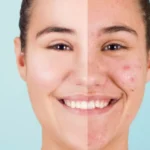Natural Solutions for Dry Skin and Scarring: Naturopathic Care in Canada
Dry skin is a common condition that occurs when the skin loses too much moisture or natural oils, leaving it feeling rough, itchy, and sometimes cracked. While it can be temporary or long-term, various factors like weather, genetics, and underlying health conditions can contribute to its severity. Understanding the different types of dry skin and how they affect the body is essential for finding the right treatment and prevention strategies.
- Dry Skin & Scarring Overview
- Symptoms & Causes of Dry Skin
- Diagnosing Dry Skin
- Dry Skin Treatments
- Diet & Medicine for Dry Skin
- Preventing Dry Skin & Scarring
- When to See a Doctor
- Naturopathic Remedies for Dry Skin
- FAQs on Dry Skin & Scarring
Overview
What is dry skin?
Dry skin, also known as xerosis, happens when the skin’s natural barrier is compromised, leading to moisture loss. This can result in discomfort, irritation, and even more severe skin conditions if left untreated.
- The skin becomes rough, flaky, and prone to itching.
- It can be caused by environmental factors like cold weather, low humidity, and excessive washing.
- Some cases of dry skin are temporary, while others may be chronic due to underlying skin conditions.

What are the types of dry skin?
There are different forms of dry skin, each with unique causes and symptoms:
- Contact Dermatitis – A reaction triggered by an allergen or irritant, leading to redness, itching, and inflammation.
- Eczema (Atopic Dermatitis) – A chronic condition that causes dry, red, and inflamed skin, often associated with allergies.
- Seborrheic Dermatitis – Affects areas with more oil production, such as the scalp and face, causing flaky and scaly patches.
- Athlete’s Foot – A fungal infection that results in dry, itchy, and peeling skin on the feet, often between the toes.
Who does dry skin affect?
While dry skin can affect anyone, some people are more prone to experiencing it:
- Older Adults – Aging skin produces less oil, making it more susceptible to dryness.
- People in Cold or Dry Climates – Low humidity and harsh winter air strip moisture from the skin.
- Individuals with Skin Conditions – Those with eczema, psoriasis, or other dermatological issues are more likely to develop dry, irritated skin.
What does dry skin look like?
Dry skin can present in different ways, depending on its severity and location:
- Rough, flaky, or scaly patches – Often seen on the arms, legs, and face.
- Tightness and discomfort – Especially noticeable after showering or washing hands.
- Cracking, redness, and peeling – In severe cases, cracks may bleed and increase the risk of infection.
How does dry skin affect my body?
Beyond just being uncomfortable, dry skin can have broader effects on your overall well-being:
- Causes itching and irritation – Persistent dryness can lead to scratching, which may cause further damage.
- Increases risk of infection – Cracked skin allows bacteria and irritants to penetrate more easily.
- Affects appearance and confidence – Flaky, dull skin can impact self-esteem and make makeup application difficult.
Understanding the causes and symptoms of dry skin helps you manage and prevent it. Next, we’ll explore key factors and signs to watch for.

Symptoms and Causes
Dry skin is a common issue that can cause discomfort, itching, and irritation. It occurs when the skin loses its natural moisture, leading to roughness, flakiness, and even cracks. Identifying the symptoms and causes of dry skin can help you take the right steps to restore hydration and protect your skin from further damage.
What are the symptoms of dry skin?
Dry skin can appear differently depending on its severity, but common signs include:
- Flakiness and peeling – Dead skin cells shed from the surface, making the skin appear dry and dull.
- Redness and irritation – The skin may become inflamed, especially in sensitive areas.
- Itching and discomfort – Dry patches can feel tight, itchy, or even painful.
- Cracks or fissures – In severe cases, the skin may crack, sometimes leading to bleeding or increased risk of infection.
- Rough, uneven texture – Affected areas may feel coarse or bumpy, particularly on the hands, knees, and elbows.
Why is my skin so dry?
Several factors can strip your skin of its natural moisture and oils, including:
- Lack of natural oils – With age, the skin produces fewer oils, leading to increased dryness.
- Harsh skincare products – Soaps, cleansers, and exfoliants with strong chemicals can strip moisture from the skin.
- Weather changes – Cold, dry air and low humidity levels make it harder for the skin to retain moisture.
- Underlying health conditions – Skin disorders such as eczema, psoriasis, or diabetes can contribute to chronic dryness.
- Poor diet – A lack of water, hydrating foods, and essential fatty acids can weaken the skin’s natural barrier, making it more prone to dryness.
Where on my body will I have dry skin?
Dry skin can affect various parts of the body, with some areas being more vulnerable than others:
- Hands and feet – These areas are frequently exposed to environmental stressors and often become rough or cracked.
- Face – The cheeks, around the mouth, and forehead are prone to dryness, especially in cold weather.
- Scalp – Dryness can cause itching, flaking, and dandruff-like symptoms.
- Legs and arms – These areas may develop rough, flaky patches, particularly in dry climates.
How do I know if I have dry skin?
If you experience any of the following, you likely have dry skin:
- Tightness after washing – Your skin feels stretched or uncomfortable after showering or cleansing.
- Persistent itchiness – You frequently scratch certain areas due to dryness.
- Visible scaling or rough patches – Your skin looks flaky or textured.
- Sensitivity to skincare products – Harsh products may cause burning or irritation.
What causes dry skin?
Dry skin can be influenced by both internal and external factors:
- Age: As you age, your skin produces less oil, making it drier and more prone to wrinkles.
- Climate: Cold temperatures, wind, and low humidity levels deplete moisture from the skin.
- Health conditions & genetics: Skin conditions like eczema, psoriasis, and a family history of dry skin can increase the likelihood of dryness.
- Occupations: Jobs that require frequent handwashing, exposure to chemicals, or long hours in dry environments can damage the skin’s protective barrier.
Understanding the symptoms and causes of dry skin allows you to take preventive steps and choose the right skincare routine to keep your skin healthy and hydrated.

Diagnosis and Tests
Diagnosing dry skin is essential to determine the best treatment plan and rule out underlying conditions like eczema or psoriasis. A professional assessment can help identify the cause and severity of your skin dryness.
How is dry skin diagnosed?
A healthcare provider will evaluate your skin through the following steps:
- Physical Examination – A family doctor, naturopathic doctor or dermatologist will check for visible signs of dryness, such as flakiness, redness, or cracks.
- Medical History Review – They may ask about your lifestyle, skincare routine, diet, and exposure to environmental factors.
- Symptom Assessment – You’ll be asked about itching, discomfort, or sensitivity to certain products.
- Testing for Underlying Conditions – If needed, they may perform tests to rule out skin conditions like eczema, psoriasis, or allergies.
Accurate diagnosis helps create a personalized treatment plan to restore moisture and protect your skin’s health.
Treatment
How is dry skin treated?
Effective treatments focus on restoring moisture and preventing further dryness:
- Regularly moisturize – Use thick creams or ointments to lock in hydration.
- Choose gentle cleansers – Opt for mild, fragrance-free soaps to avoid irritation.
- Limit hot showers and long baths – Hot water strips natural oils from your skin.
- Support skin health through diet – Eat hydrating foods, healthy fats, and drink plenty of water.
How do I manage symptoms of dry skin?
Daily habits can help soothe dryness and reduce discomfort:
- Use a humidifier or oil diffuser – Increases moisture in the air, preventing dryness.
- Apply moisturizer after bathing – Helps seal in hydration while skin is still damp.
- Avoid scratching dry or itchy areas – Scratching can cause irritation and lead to infections.
- Wear soft, breathable fabrics – Harsh materials like wool can worsen dryness.
Are there side effects of having dry skin?
If left untreated, dry skin can lead to additional concerns:
- Increased risk of skin infections – Cracks in the skin can allow bacteria to enter.
- Persistent itching and discomfort – Can interfere with daily activities and sleep.
- Reduced self-confidence – Visible dryness and flakiness may affect appearance.

Dry Skin on Babies
Infant skin is delicate and requires extra care. If your baby has dry skin, consider the following:
How to get rid of dry skin on a baby’s face?
- Use gentle, fragrance-free baby moisturizers – Prevents irritation and keeps skin soft.
- Avoid harsh soaps – Wash with lukewarm water and mild cleansers.
- Support skin health with Omega-3 oils – Helps nourish skin from within.
- Give probiotics – Promotes a healthy gut microbiome, which benefits skin health.
What is Good or Bad for Skin Dry
Is hyaluronic acid good for dry skin?
Yes, it attracts and retains moisture, keeping skin hydrated. Hyaluronic acid supplements can enhance skin hydration from within.
Does niacinamide dry out skin?
No, it strengthens the skin barrier and improves moisture retention.
Does retinol dry out skin?
Yes, retinol can cause dryness, especially in the beginning. Start with a low concentration and gradually increase usage over time.
Does vaseline help with dry skin?
Yes, it locks in moisture and protects the skin barrier. Safe for both adults and children.
Is salicylic acid good for dry skin?
No, it removes oils and can worsen dryness.
Note: For the best treatment plan, speak to your doctor or naturopath to ensure you’re using the right products and lifestyle habits for your skin type.
Diet
The right diet and natural remedies can help hydrate and restore moisture. Here are some foods to eat and remedies to try for healthier, more hydrated skin.
What should I eat or drink with dry skin?
A healthy diet plays a crucial role in managing dry skin. By consuming foods that promote hydration and nourish your skin, you can help combat dryness from within. Certain foods can provide your skin with essential nutrients like healthy fats, vitamins, and antioxidants, which are key to maintaining skin moisture and elasticity.
Foods to include in your diet for dry skin:
- Foods rich in healthy fats: Healthy fats help maintain the skin’s natural moisture barrier and promote cell regeneration. Examples: Avocado, nuts, seeds, and fatty fish like salmon and mackerel.
- Hydrating foods: Fruits and vegetables with high water content can help keep your skin hydrated from the inside. Examples: Watermelon, apples, mangoes, grapes, pears, cucumbers, tomatoes, and fresh leafy greens.
- Plenty of water: Drinking enough water throughout the day is essential for overall hydration. Aim to drink at least 8 glasses of water daily to help keep your skin hydrated.

What are some natural remedies for dry skin?
Natural remedies can help hydrate and restore moisture to dry skin, complementing your skincare routine for better skin health.
Top Natural Remedies for Dry Skin:
- Coconut oil: Moisturizes and soothes dry, irritated skin.
- Oatmeal baths: Calms itching and irritation.
- Aloe vera gel: Hydrates and improves skin texture.
- Hydration: Keep urine light yellow to ensure hydration.
- Healthy fats: Nourish skin with avocado oil, olive oil, nuts, and seeds.
- Honey: Use as a spot treatment for dry patches.
- Avoid harsh chemicals: Steer clear of products with fragrances or alcohol.
- Antioxidants and omega-3s: Eat fatty fish and leafy greens to reduce inflammation.
- Humidifier: Adds moisture to dry air.
- Short, lukewarm showers: Prevent skin moisture loss.
- Avoid allergens: Limit exposure to irritants and use gentle products.
Medicine
What type of lotion or moisturizer is best for dry skin?
When choosing a lotion or moisturizer for dry skin, it’s important to look for products that are rich in ingredients that help lock in moisture and repair the skin barrier. Thick, fragrance-free creams are ideal, as they provide long-lasting hydration without irritating sensitive skin.
Best lotions and moisturizers for dry skin:
- Thick, fragrance-free creams: These creams help to deeply hydrate and restore moisture.
- Ingredients to look for:
- Ceramides: Help to restore the skin’s natural barrier.
- Glycerin: Draws moisture into the skin.
- Hyaluronic acid: Attracts and retains moisture, keeping skin plump and hydrated.
What medicine to take for dry skin?
In addition to topical treatments, there are some medications that can help manage dry skin, especially when it’s accompanied by inflammation or severe itching.
- Hydrocortisone creams: Over-the-counter hydrocortisone creams can help reduce inflammation and irritation caused by dry skin.
- Oral antihistamines: If itching is severe, antihistamines can provide relief by reducing the allergic response that causes itching.
Notice: For persistent or severe dry skin, consult a doctor or naturopathic professional to identify the cause and recommend proper treatments. Always check with a healthcare provider before starting new treatments.
Prevention
How can I prevent dry skin?
Preventing dry skin is easier than treating it once it appears. By incorporating simple habits into your routine, you can keep your skin hydrated and healthy year-round.
Prevention tips for dry skin:
- Moisturize daily: Apply moisturizer right after washing to lock in moisture.
- Wear gloves: Protect your hands in cold weather or when using harsh cleaning products.
- Use a humidifier: Keep the air moist indoors, especially in winter, to prevent skin from drying out.

Contact a Medical Professional
Who treats dry skin?
If you’re struggling with persistent dry skin, it’s important to seek help from professionals who specialize in skin health.
Professionals who treat dry skin:
- Dermatologists: Experts in skin conditions and treatments.
- Naturopathic Doctors: Provide natural and holistic remedies for skin health.
When should I see my healthcare provider?
You should consult a healthcare provider if your dry skin doesn’t improve with self-care or if it worsens, especially if cracks become infected.
What questions should I ask my doctor?
When visiting your healthcare provider, it’s helpful to ask the right questions to better understand your condition and get the most effective treatment.
Key questions to ask your doctor:
- What’s causing my dry skin?
- What skincare routine is best for me?
- Are there any medical treatments I need?
- Are there any natural treatments I should try?
- What should I be eating and drinking for healthier skin?
- Are there any supplements that can help with dry skin?
Read More: What do Functional Doctors do?
Naturopathic Treatments
How can Naturopathic Doctors help?
Naturopathic Doctors focus on identifying the root causes of dry skin and provide natural, holistic treatments to address these underlying factors.
How Naturopathic Doctors can help:
- Identify root causes: They can diagnose issues like allergies or nutrient deficiencies.
- Recommend natural remedies: Suggest dietary changes and natural treatments for dry skin.
- Run blood work: Ensure you’re getting enough healthy fats and nutrients for skin health.
- Functional lab testing: Uncover the root cause of your dry skin symptoms.
- Create personalized treatment plans: Based on a thorough intake and detailed testing, they develop individualized plans for long-term skin health.

Naturopathic Treatments for dry skin?
Naturopathic treatments aim to restore skin health by addressing internal imbalances and nourishing the body through natural remedies.
Naturopathic treatments for dry skin:
- Personalized diet plans: Focus on omega-3s, healthy fats, hydrating foods, and antioxidants.
- Blood work and functional lab testing: Determine the root cause of your symptoms and inform treatment.
- Natural topical emollients: Use shea butter or calendula cream for symptom relief.
Read More: What is the Role of Naturopathic Doctors?
Supplements for hydration and itch relief:
- Omega-3s Omega-6s Hyaluronic Acid
- Wheat germ extract Astaxanthin
- Oral ceramides Collagen protein
Natural antihistamines for itching relief:
- Spirulina Black cumin seed oil Stinging nettle
- Vitamin C Quercetin Butterbur
- Bromelain Probiotics
Functional foods: Boost skin quality and hydration with foods like:
- Dark chocolate
- Flaxseeds
- Mixed nuts
- Foods rich in vitamin C
What other skin conditions can be treated with naturopathic treatment?
Naturopathic treatments are not limited to dry skin. They can also help manage a variety of other skin conditions, promoting overall skin health.
Other conditions treated with naturopathic treatments:
- Eczema Acne (Find Our Acne Treatment)
- Rosacea Psoriasis
- Melasma
A note from Dr. Sanam – Your Naturopathic Doctor
Dry skin can be frustrating, but with the right approach, it can be treated effectively. As a Naturopathic Doctor, I focus on identifying the root causes of your skin concerns and providing personalized care to help you achieve healthy, hydrated, and glowing skin.
Additional Common Questions
Why is my skin so dry even when I moisturize?
- You may need a thicker moisturizer or a different type of product to better lock in moisture.
- Underlying conditions, such as eczema or allergies, could also be contributing to your dry skin.
- Dietary factors, such as a lack of healthy fats or hydration, might be affecting your skin’s moisture levels.
Can dry skin cause acne?
Yes, dry skin can weaken your skin’s natural barrier, leading to irritation, clogged pores, and breakouts. Keeping your skin hydrated and using the right treatments can help. Check out our acne treatment for clear, healthy skin!
How to get rid of dry skin?
Moisturize regularly, avoid harsh soaps, and use a humidifier to help maintain skin hydration.
Can Naturopathic care help dry skin?
Absolutely. Naturopathic care addresses both the symptoms and the root causes of dry skin, offering personalized solutions for long-term relief.
Which Naturopathic doctor should I call to control dry skin?
Reach out to Dr. Sanam Arora for personalized, virtual care tailored to your unique needs.






